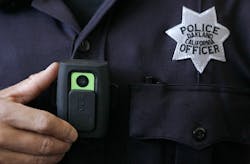The NYPD won’t implement a judge’s order to outfit cops with surveillance cameras until it has a gun to its head, sources said yesterday.
And the department has an unaccustomed ally: the police union.
After a Manhattan federal judge ripped the NYPD’s stop-and-frisk policy Monday and ordered remedial measures such as the cameras, union lawyers began researching whether the camera requirement was even legal.
Sources said it’s possible that cops can’t be forced to wear the extra equipment without it being first negotiated as part of their union contract.
Sources added that police higher-ups didn’t hold meetings or discussions — or even order any research — into the cameras yesterday.
That’s because the department is banking on a higher court to ultimately toss the directive, sources said.
The city and the Police Department “are filing an injunction and hoping the judge sees our point,’’ a law-enforcement source said.
No timetable was set for any of the judge’s proposed fixes to the system.
And there were no cues coming yesterday from court-appointed monitor and former Manhattan prosecutor Peter Zimroth.
Zimroth is currently on vacation in New Hampshire at a cabin owned by the family of his wife, Oscar-winning actress Estelle Parsons, sources said.
Pat Lynch, head of the Patrolmen’s Benevolent Association, said “there is simply no need to equip patrol officers with body cams’’ anyway.
“Our members are already weighed down with equipment like escape hoods, Mace, flashlights, memo books, ASPs, radio, handcuffs and the like,’’ he said. “Additional equipment becomes an encumbrance and a safety issue for those carrying it.
“Given that the root cause of this stop-and-frisk problem is a significant shortage of police officers in local precincts, it seems to us that the monies spent on a body-cam pilot program would be better spent on hiring more police officers and providing them with extensive field training.”
The cameras, which typically cost $300 to $950 apiece, can be attached to hats, Oakley sunglasses and shirt collars. Most cops use the sunglasses and collars.
The palm-sized cameras are used by dozens of police departments across the country, including in Fort Worth, Texas, Albuquerque, NM, and Daytona Beach, Fla., said manufacturer Taser International.
According to company vice president Steve Tuttle, officers have used the footage to clear themselves in shootings, as well as to document serious car accidents and suicide rescues.
In one dramatic case, a cop in Lake Havasu City, Ariz., recorded footage of a suicidal man pointing a gun to his head and cops rescuing him.
Another officer, in Fort Smith, Ark., used footage to show he’d done nothing wrong when he shot a man.
“It’s revolutionary — it disproves meritless complaints against police officers,” Tuttle said.
Police Sgt. Troy Sterling, of the Lake Havasu Police Department said that at first, cops there complained about using them because they didn’t like being watched all the time.
But “we’ve been able to use footage on several of [internal-affairs] investigations to show unfounded claims,” and now, all patrol officers carry them, he said.
He said he was unaware of any legal issues surrounding their use.
But in East New York, Brooklyn, where the cops would be outfitted with the cameras, residents gave a thumbs-down to the equipment.
“I wouldn’t talk to a cop with a camera. They could do anything with that video. They could edit it,’’ said Michael Coles, 27. “It’s infringing on my privacy.”
Eric Wilson, 21, added, “If I see a cop with a video, I’m not talking to him, nope, not at all. It would be detrimental to us around here . . . They might think I’m an informer.”
In Mott Haven in The Bronx, MTA worker Alex Rosario said cops should stick to stop-and-frisk.
“People use it as a scapegoat and say they’re being profiled, but cops are just doing their job,’’ he said. “If a cop thinks you look suspicious, they have the right to stop you. If you have nothing to hide, you shouldn’t be worried.
“I’ve been stopped a few times, here and on the train station. It doesn’t bother me. They’re just doing their job.”
Republished with permission of The New York Post



